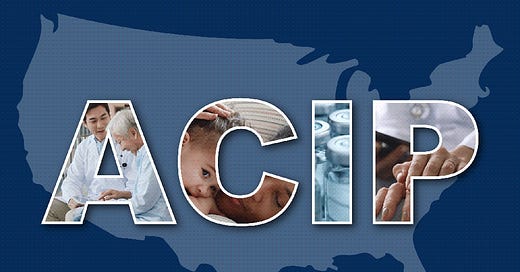CDC Vaccine Advisory Committee Meeting Agenda for next week raises eyebrows
What is really at stake during the ACIP Meeting on June 25-26
In a sweeping and unprecedented move, Health Secretary Robert F. Kennedy Jr. recently dissolved all 17 members of the CDC’s Advisory Committee on Immunization Practices (ACIP), replacing them with just eight appointees — several of whom have publicly questioned vaccine safety or aligned with anti-vaccine sentiment. Now, with the first meeting of the newly reconstituted committee set for June 25–26, a draft agenda reveals a startling shift in priorities that could have significant consequences for public health, vaccine access, and scientific integrity.
According to the newly posted draft agenda, the two-day meeting includes discussions on expected topics like COVID-19, RSV, and influenza vaccines, but with some critical caveats. On Day 1, the committee will review the latest epidemiology and safety data on COVID-19 vaccines, yet notably, no recommendation votes will be held — a significant departure from past ACIP practices. Instead, votes are planned only for maternal and pediatric RSV vaccines and their inclusion in the Vaccines for Children (VFC) program. Also scheduled are agency updates from CDC, FDA, CMS, NIH, and others.
Day 2 shifts the focus to influenza, with discussions and votes not just on annual flu shots, but on the use of multi-dose vials that contain thimerosal — a preservative long targeted by anti-vaccine activists despite overwhelming evidence of its safety. There will also be sessions on MMRV (measles, mumps, rubella, and varicella) vaccines, chikungunya, and anthrax, though these are currently listed for discussion only, without formal votes. The inclusion of thimerosal on the voting docket — and the conspicuous absence of votes on key routine vaccines like HPV and meningococcal — is deeply concerning.
To many observers, this agenda is not just unusual — it’s alarming. Thimerosal was largely removed from childhood vaccines over two decades ago as a precautionary move, and numerous studies have shown no link to autism or other developmental disorders. Revisiting it now seems less about public health and more about validating disproven narratives that continue to fuel vaccine hesitancy. Experts like Dr. Paul Offit have warned that reopening this debate could make flu vaccines more expensive, harder to access, and more mistrusted — especially as multi-dose vials are critical for large-scale, cost-effective distribution.
What’s more, the new committee has delayed or sidelined discussion of routine vaccines that protect against HPV and meningococcal disease — staples of the adolescent immunization schedule. Even the COVID-19 discussion is stripped of decision-making power, suggesting that the CDC will not be prioritizing pandemic-related immunization guidance at a time when updated recommendations are still crucial, particularly for vulnerable populations.
This reorientation has already triggered resignations within the CDC and concern among national health organizations. Doctors, pediatric societies, and public health leaders warn that politicizing the advisory process could fracture vaccine delivery systems, disrupt insurance coverage tied to ACIP recommendations, and undermine the trust that allows vaccination programs to function effectively. The American Academy of Pediatrics and over 30 other physician groups have already spoken out, urging continued COVID-19 vaccine recommendations for pregnant individuals after Kennedy's office suggested abandoning them.
In this new ACIP landscape, the stakes are not merely symbolic. ACIP votes determine what vaccines are covered by insurance, which are included in the federal VFC program, and how local health departments guide their immunization practices. Skewing the agenda toward fringe concerns, while punting on essential vaccines, could create ripple effects in access, equity, and public confidence.
As the meeting approaches, eyes will be on the new appointees, the direction of their votes, and how the CDC — now lacking a confirmed director — handles the growing tension between evidence-based policy and political influence.
On a personal note, I have been contacted by an anonymous source at the CDC about more potential changes to ACIP. If I am able to confirm these changes with substantial evidence, then I will share this widely. It is possible these issues may come to light next week during the ACIP meeting, but there may be more problems for previous vaccines if what I have been told is true.
If the June ACIP meeting is any indication, the future of U.S. vaccine policy may no longer be driven by science alone — and that should concern everyone.
Although not required, any support is greatly appreciated.





This is insane, people are going to die. The measles outbreak now is just a taste of what could happen
Thank you for keeping us informed.